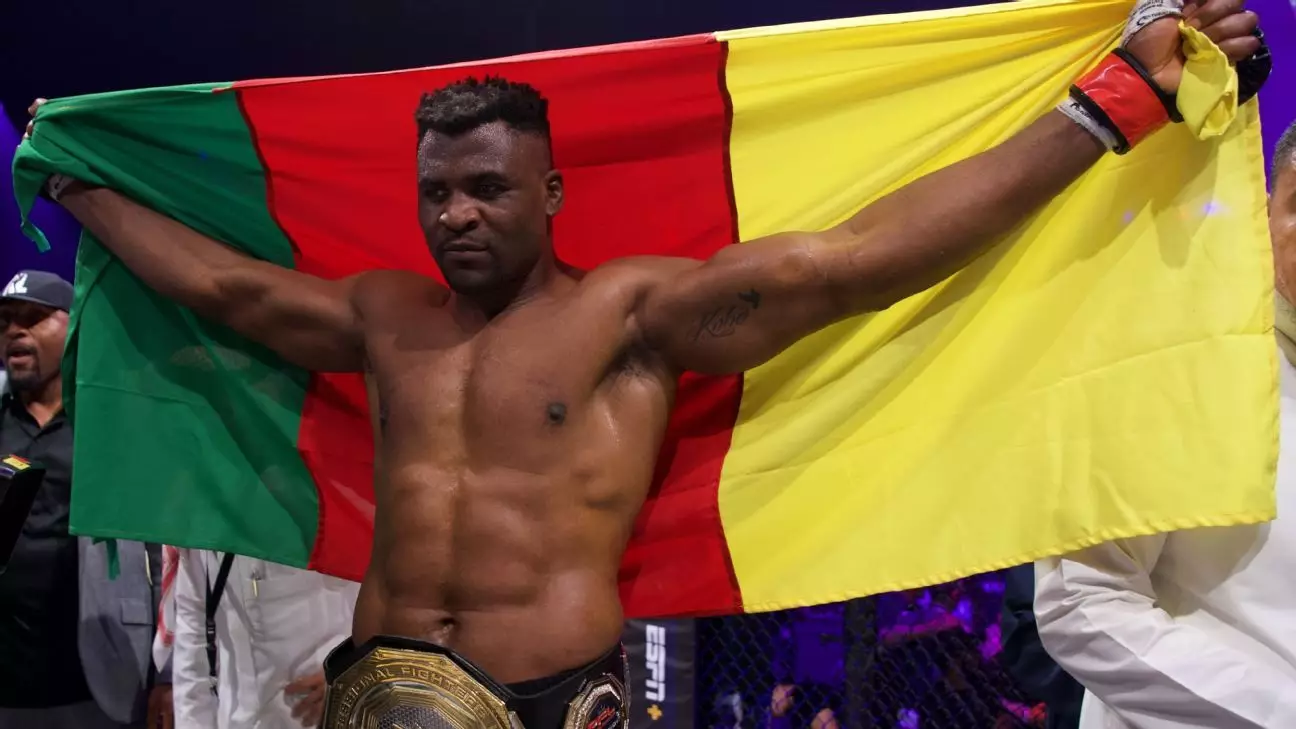Francis Ngannou’s journey in the world of mixed martial arts (MMA) is nothing short of cinematic. After experiencing a tumultuous two-year foray into boxing, which included the heartbreaking loss of his son, Ngannou made a triumphant return by defeating PFL heavyweight champion Renan Ferreira at PFL Super Fights in Abu Dhabi. Despite his impressive comeback, the narrative has been punctuated by ongoing tensions with UFC CEO Dana White, who has publicly scrutinized Ngannou’s choices and career trajectory.
Ngannou’s departure from the UFC was not simply a career move; it marked a significant shift in how fighters negotiate value versus their worth in combat sports. With the UFC long dominating the MMA landscape, Ngannou’s choice to leave represented a rebellion against a system he felt undervalued him. As he has clearly stated, this choice has been part of a strategic journey aimed at reclaiming the narrative around his worth—both personally and financially.
In the lead-up to UFC 308, White’s remarks about Ngannou reflected more than just professional rivalry; they highlighted a deeper resentment and need to maintain control over the narrative surrounding the UFC brand. White claimed that he considered cutting Ngannou before he became champion and insinuated that Ngannou was avoiding a fight against current heavyweight champion Jon Jones out of fear. Ngannou, unfazed, publicly criticized White’s assertions during an interview, suggesting that Dana is struggling to reconcile his feelings about Ngannou’s departure and subsequent success.
Ngannou’s rebuttal points to a toxic dynamic often observed in high-stakes sports management, where promoters sometimes vilify former stars to bolster their interests. This strategy, however, often backfires, as athletes like Ngannou leverage their stories to gain wider recognition and financial empowerment outside their former promotions. Ngannou’s dismissal of White’s speculations positions him as not just a fighter, but as an individual reclaiming his agency in an industry that often sidelines the narratives of its athletes.
Ngannou made the decision to sign with the Professional Fighters League (PFL) after leaving the UFC in January 2023. By joining the PFL, he gained the autonomy to pursue lucrative boxing matches that eventually culminated in fights against notable champions like Tyson Fury and Anthony Joshua. Although Ngannou faced defeat in both bouts, the financial payoff—amounting to an estimated $20 million for those two fights—significantly exceeded the financial packages presented by the UFC.
Despite White’s claims that Ngannou would have made more money had he stayed, Ngannou vehemently disputes this narrative. He alleges discrepancies in financial back-pay and accuses the UFC of failing to fulfill outstanding payments owed to him. With an income multiplier that Ngannou asserts is double what he could have earned had he remained under UFC’s banner, the numbers speak for themselves. It raises an inherent question about the transparency in UFC’s financial dealings and how they can cast doubt on a fighter’s potential earnings to discredit them post-departure.
Central to the ongoing narrative is the desire for a showdown between Ngannou and Jon Jones. Ngannou has expressed unwavering interest in this match-up, asserting that both he and Jones would be willing participants if afforded the opportunity. However, the road to this fight seems obstructed by Dana White’s reluctance to entertain ideas that feature Ngannou prominently, showcasing the ongoing feud between the fighter and the UFC’s management.
As Jones prepares for a fight against former champion Stipe Miocic, the anticipation for a potential future contest between him and Ngannou looms large. For many fans, this match represents not just a battle of heavyweight titans, but a symbolic clash between the new era of fighter autonomy and the traditional power structure embodied by the UFC. Ngannou recognizes that the key to making this much-anticipated fight happen rests primarily on White’s ability to set aside personal grievances.
One of the most interesting developments surrounding Ngannou’s potential fight with Jones is the involvement of external entities like Turki Alalshikh, the Chairman of Saudi Arabia’s General Entertainment Authority. Alalshikh’s backing for events like the Riyadh Season, combined with his financial support for Ngannou’s high-profile boxing bouts, could provide a bridge over the divide created by the longstanding animosity between Ngannou and White.
For Ngannou, the prospect of a Jones fight is not just about glory or legacy—it’s about finally realizing his potential in a sport that has both defined and constrained him. It ultimately boils down to whether the UFC can evolve beyond its historical patterns of control and recognize the value of granting fighter autonomy. Alalshikh could indeed be the key to opening doors that have long been closed for fighters like Ngannou, turning dreams into reality amid the politics of combat sports.
In essence, Francis Ngannou’s tale is one of resilience, navigating heartbreak, and championing the fight for dignity and respect in an industry often marred by power struggles. Whether the narrative shifts towards a confrontation with Jones remains to be seen, but Ngannou’s journey compels admiration and stirs conversation about the future of athlete empowerment in MMA.

